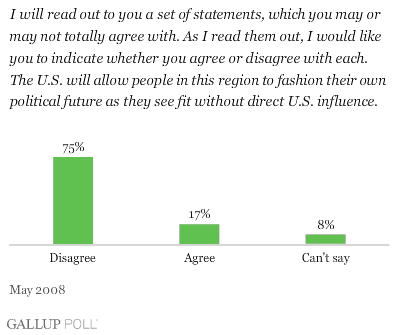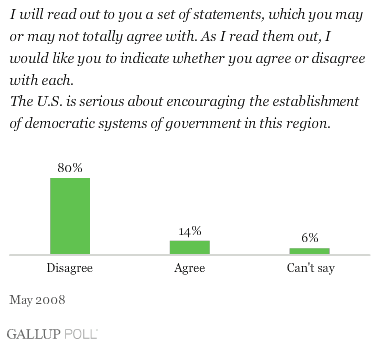WASHINGTON, D.C. -- The Obama administration reacted Monday to the final declaration of President Mahmoud Ahmadinejad as the winner of Iran's disputed election with Secretary of State Hillary Clinton simply saying, "these internal matters are for Iranians themselves to address." Such a stance may be welcomed by Iranians, 75% of whom in 2008 disagreed with the statement, "The U.S. will allow people in this region to fashion their own political future as they see fit without direct U.S. influence."

While the Obama administration's initial remarks to Iran's post-election protests sparked some criticism from congressional leaders for being too timid in supporting the cause of post-election demonstrators, the president's press conference on June 23 later condemned the government crackdown on protesters. In expressing its disapproval, the Obama administration has also rescinded invitations previously extended to Iranian diplomats for July 4 celebrations hosted in U.S. embassies in various countries.
In response to Obama's comments, Ahmadinejad and other Iranian leaders likened Obama's remarks to those made by President George W. Bush and his administration. Meanwhile, neither reform candidate Mir Hosseini Mousavi nor Mehdi Karroubi has backed down from his allegations of electoral fraud in last week's election.
In 2008, even as the Bush administration continued its vocal support of some democratic movements and opposition activists throughout the Middle East, 80% of Iranians disagreed that the U.S. was serious about encouraging democracy in the region.

Other 2008 ÆéûÜǨû§Polls in the region also revealed widespread skepticism. For example, when ÆéûÜǨû§asked Egyptians, Lebanese, and Saudis about their opinion on the same statement in May 2008, 76%, 74%, and 72%, respectively, disagreed.
In 2008, ÆéûÜǨû§also asked Iranians an open-ended question about what the U.S. should do to improve relations with the Muslim world. After "not to mock anything related to religion," which 20% of respondents mentioned, "stop its pride and arrogance" (15%) and "stop its interference in internal affairs of Muslim countries" (11%) were among the most frequently mentioned actions.
Discussion
The skepticism that exists within Iran and the greater Middle East on U.S. seriousness in encouraging democracy or refraining from prohibiting people in the region from fashioning their own political future is unlikely the result of democracy promotion alone. The U.S.-led invasion of Iraq and the over throw of Saddam Hussein's government, a former U.S. ally, is no doubt a factor, as are U.S. and European policies of economic and political isolation in reaction to Hamas' 2005 election victory in the Palestinian Territories.
That said, some analysts have suggested that U.S. leadership should avoid explicit endorsements of a particular political dissident or leader within the region because what is intended as an embrace of support, can often translate into the kiss of death for the domestic legitimacy of such individuals and movements among their local constituencies.
In his Cairo speech, Obama was praised throughout the region for acknowledging CIA intervention during the Cold War, leading to the overthrow of a democratically elected government in Iran. He implied that the U.S. should not be in the position of dictating to others what they must do in their own countries by saying "no system of government can or should be imposed upon one nation by any other." The current administration seems to recognize that the more U.S. leadership publically embraces opposition activity within the Islamic Republic, the more such movements and activists within them will be characterized as illegitimate to local people as foreign intervention.
Survey Methods
Results are based on face-to-face interviews with 1,004 and 1,040 adults, aged 15 and older, conducted in July 2007 and May 2008, respectively, in Iran. For results based on the total sample of national adults, one can say with 95% confidence that the maximum margin of error over the two-year time period is ôÝ3.5 percentage points. Results for polls conducted in Egypt, Lebanon, and Saudi Arabia are based on interviews with 1,105, 1,000, and 1,150 individuals, respectively, in each nation. Results based on the total sample of national adults, one can say with 95% confidence that the maximum margin of error among those three nations was ôÝ3.8 percentage points. In addition to sampling error, question wording and practical difficulties in conducting surveys can introduce error or bias into the findings of public opinion polls.
